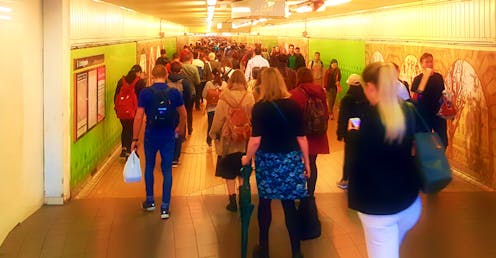Introducing OzSAGE, a source of practical expert advice for how to reopen Australia from COVID safely
- Written by Richard Holden, Professor of Economics, UNSW

Australia is in the middle of its worst COVID-19 outbreak. Our hospital system is under strain. Vulnerable communities are being hit hard. And more than half the nation is locked down.
There is an understandable desire to know when we can reopen. But there is also an even more important need to know how we can reopen.
The national plan[1] endorsed by the prime minister and state and territory leaders goes part of the way to answering this question.
It sets thresholds for the proportion of the 16-plus population vaccinated beyond which it says certain restrictions can be less common.
But it doesn’t talk much about the other things we will have to do.
How we reopen is as important as when
It’s the big gap in the national approach. And it needs to be filled. Now.
That is what OzSAGE[2] aims to do. OzSAGE is an additional expert resource for governments and business, health, education, community and non-government agencies in Australia.
Inspired by the UK Independent SAGE[3] (Independent Scientific Advisory Group for Emergencies), OzSAGE members have expertise in public health, infectious diseases, epidemiology, Aboriginal health, engineering, the built environment, occupational hygiene, behavioural and social science, multicultural engagement, communications, law, data science, public policy and economics.
Ventilation will become a priority
Our first piece of advice on how to best live with occasional outbreaks centres on ventilation and what we are calling vaccines-plus.
Ventilation (and filtration) is about providing safe air and limiting transmission in shared spaces. These include workplaces, health and aged care, schools, prisons, social venues and homes, especially where overcrowding is present. COVID is airborne, meaning prevention requires safe air.
Vaccines are essential to our pandemic exit strategy, but overseas experience shows current vaccines alone are not sufficient to fight the Delta variant.
“Plus” refers to testing, contact tracing, masks and other non-pharmaceutical strategies that will continue to be required in the medium term to fight Delta, and may need to be scaled up or down depending on severity of the epidemic.
Our first recommendations have been with politicians for a week.
They are released publicly this morning[4].
QUT’s Distinguished Professor Lidia Morawska, OxSAGE.One of the things that made Australia’s 2020 pandemic response world-leading was that we acted early to keep the virus under control. This gave us options other countries did not have.
As we reopen we should ensure we do so safely enough to retain what economists call “option value” — the ability to adapt to changing circumstances.
Our approach should entail the following elements.
1. Living with occasional outbreaks rather than widespread disease
COVID-19 is here to stay, but we don’t have to resign ourselves to losing all the gains won in 2020. We should aim to control COVID-19 in the same way we control measles, which is even more contagious.
Right now that requires ventilation and “vaccines-plus” to manage outbreaks. But the level of innovation in vaccines is extraordinary.
When boosters or vaccines matched to variants are available, herd immunity ought to be possible using a smart and agile vaccine strategy.
2. Leaving no-one behind
Vaccine targets should be met for all, not only for the population as a whole but also for subgroups, recognising structural and social disadvantage.
These include all Aboriginal and Torres Strait Islander people, residents of remote and regional Australia, and other vulnerable high-risk and disadvantaged groups.
While vaccination is not available yet for all children, we recommend additional steps to protect them and make schools safe.
3. Protecting the health system
Australia has one of the best healthcare systems in the world. Despite this, urgent non-COVID care is already suffering in NSW.
We plan to outline a range of strategies essential to preventing the loss of health workers and protecting hospitals and their patients in cities and in regional areas.
Read more: Poorly ventilated schools are a super-spreader event waiting to happen. It may be as simple as opening windows[5]
The best-laid plans to reopen will be disrupted if the capacity of the health system to deal with COVID and non-COVID care is exceeded by a surge.
I am proud to be part of an expert group that will provide independent, cross-disciplinary advice on how to open up safely.
What’s next?
Our advice will be informed by the best evidence, but will be practical. It will provide government, business, and community organisations with a series of tangible measures that can be taken to ensure we can reopen safely.
Nobody knows what 2022 will hold. But we need to ensure Australia is in a position to consolidate its successes and avoid repeating its recent mistakes.
Proper ventilation is a start. We will have more to say in coming weeks.
References
- ^ national plan (www.pm.gov.au)
- ^ OzSAGE (www.ozsage.org)
- ^ UK Independent SAGE (www.independentsage.org)
- ^ this morning (www.ozsage.org)
- ^ Poorly ventilated schools are a super-spreader event waiting to happen. It may be as simple as opening windows (theconversation.com)
Authors: Richard Holden, Professor of Economics, UNSW














